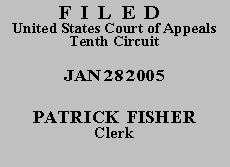

| DAVID ADOLFO HERNANDEZ-NAVARRO; ARACELI
AVENDANO
FLORES; LUIS RICARDO
HERNANDEZ,
Petitioners, v. JOHN ASHCROFT, Respondent. |
A70-910-678, A70-910-679)
|
We have for consideration the government's motion to dismiss the petition for review for lack of jurisdiction, and petitioners' response. We agree that we lack jurisdiction over the petition for review.
Petitioners are natives and citizens of Mexico who face removal from this country for having unlawfully entered the United States. They were noticed to appear for removal proceedings in 2002. They all sought and were denied cancellation of removal under 8 U.S.C. § 1229b(b)(1).
Because petitioners were noticed to appear after April 1, 1997, this case is governed by the permanent rules of the Illegal Immigration Reform and Immigrant Responsibility Act of 1996 (IIRIRA), Pub. L. No. 104-208, 110 Stat. 3009 (Sept. 30, 1996). Under IIRIRA's permanent rules, we ordinarily lack jurisdiction to review the denial of cancellation of removal, because it is a discretionary form of relief. Morales Ventura v. Ashcroft, 348 F.3d 1259, 1261-62 (10th Cir. 2003) (discussing 8 U.S.C. § 1252(a)(2)(B)(i)). We left open in Morales Ventura whether there might be circumstances in which we have jurisdiction to consider a "substantial constitutional issue." Id. at 1262.
Petitioners argue that the time limitations relevant to the "continuous physical presence" requirement for cancellation of removal are both arbitrary and less lenient toward illegal aliens than before IIRIRA was passed. See 8 U.S.C. § 1229b(d)(2). We are unpersuaded, however, that petitioners' challenge to the expressed will of Congress in § 1229b(d)(2) presents a substantial constitutional claim. As a result, we lack jurisdiction over petitioners' petition for review.
The government's motion to dismiss is granted, and the petition for review is DISMISSED.
ENTERED FOR THE COURT
PER CURIAM
*. This order and judgment is not binding precedent, except under the doctrines of law of the case, res judicata, and collateral estoppel. The court generally disfavors the citation of orders and judgments; nevertheless, an order and judgment may be cited under the terms and conditions of 10th Cir. R. 36.3.